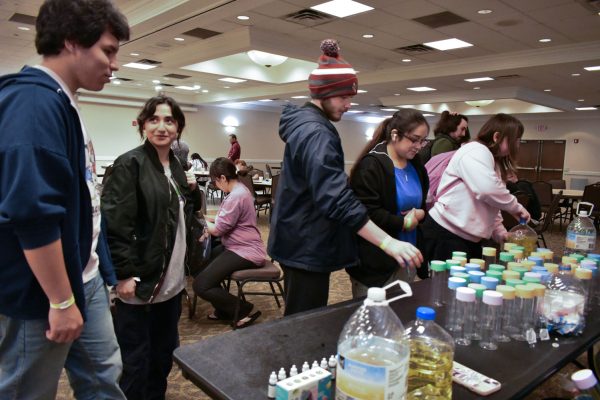Campus marijuana use increasing
Texas is coming late to the game. Both Colorado and Oklahoma have legalized marijuana to some degree. And with more than 20 states who have done the same, college campuses have been put in a position that will require them to revisit how they promote drug-abuse prevention.
The campus police work together with university officials to ensure students maintain the policies set regarding marijuana use, and despite the legalization of marijuana swarming across states, MSU officials stand firm on maintaining a drug-free campus.
Police Chief, Patrick Coggins said, “We’ve seen an increase in the use of marijuana in general, especially in the last few years.”
According to the MSU crime log, in 2019 there have been four cases related to drug possession and/or drug paraphernalia, three in Sunwatcher Village and one in Pierce Hall.
“What’s kind of odd is that colleges and universities would have higher numbers for alcohol violations and lower numbers for marijuana and drug use,” Coggins said. “But they are exchanging places now, and we’re seeing less alcohol use and more marijuana use.”
According to MSU annual security and fire safety report, in 2017 there were 27 drug law violation arrests compared to one arrest concerning liquor law violations.
Over the course of two years (2015-2017), MSU has experienced a rise in marijuana and drug use across campus. Whereas, in 2015 liquor law violations were higher, running at 76 for disciplinary action and five for arrests.
Kendra Scott, psychology senior, said, “Drugs can be an issue on campus because of the consequence students may face. It’s also not an issue because students should be allowed to do what they want, while still being cautious about how their actions may affect others.”
Compared to neighboring campuses, MSU had almost twice as many drug law violations referrals as Cameron University but Tarleton had twice as many in 2017. However, MSU had the most drug law arrests on campus in 2017.
Christopher Hawkins, criminal justice sophomore, said, “No, it [drugs] can’t be that big of an issue because as students we are not seeing a call to action in terms of reducing marijuana influence on campus.”
Though MSU continues to experience an increase in marijuana and drug use across campus, the university believes in approaching these issues in an educational manner. There are a number of educational programs, and resources made available to students to provide a clear path toward the right decision.
Director of Student Rights and Responsibilities Dail Neely said the ‘Think About It’ program, which all incoming students are required take, is the university’s first line of defense when tackling drug prevention. In addition, online educational tools for students that are found in violation of the drug policies.
The campus policies on drug use are split between two different areas, one pertaining to standard drug use or narcotics, and the other on the abuse of prescribed medications. In any case where students fail to uphold these policies there are a range of consequences which depend on a number of factors.
Kristi Schulte, director of residence life and housing, said, “There are a range of consequences if a student is found responsible for violating the policy on campus and these sanctions depend on a number of factors. Possible sanctions may include housing probation, an educational course about marijuana use, administrative reassignment to another housing location, and removal from housing.”
All cases involving drug use on campus that the administrators and university police officers encounter are different and understanding the difference between policy violation and violation of the law is emphasized within the university.
The degree of punishment associated with possessing marijuana, when discussing violations of the law solely depends on the weight. Amounts of marijuana between two to four ounces is considered a misdemeanor in the state of Texas, which could result in confinement in jail or probation. Pounds or serious amounts of marijuana are classified as a felony, which could range from a lower level felony to first degree depending on how much one possesses.
Coggins said, “Most of the numbers we see come well under four ounces, so many [students] are charged for a misdemeanor offense.”
Establishing whether the violation is of the law or university policy is an important step when determining the consequences for the students, whether it be first or second offense.
“Sometimes a policy violation is also a violation of the law,” said Neely. “But we can have a policy violation without it being a violation of the law. The police are there to enforce the law, not the policies.”
Schulte said, “It’s important for students to be aware of university policies. However, we also have to recognize the importance of bystanders within the community. We have a very well-trained staff who conduct regular health and safety checks throughout all of our living areas. Unfortunately, it is unrealistic for them to cover all housing areas at all times.”
Though these policies are set in place, the university still strives to understand the perspective of the student. By using tactics that respect resident privacy, while still enforcing the policies.
“The [tactics of drug prevention] that are most effective, are making personal relationships with students, and understanding that someone may have a policy violation and need help. Rather than chastising them, address the issue and provide hope for the students,” said Neely.
It’s clear that the legalization of marijuana across the U.S. has resulted in a shift of attitudes towards drug use, especially in students.
Students can expect more programs and educational tools in order to help students say no to drugs, and achieve success.
Neely said, “The more that we can help students and prevent students from using [drugs], the more successful they’re going to be. That’s the end goal, to make sure [students] graduate.”
Legislature
Marijuana reform advocates are hopeful for change in 2019. Texas for Responsible Marijuana Policy, a coalition that includes the National Organization for the Reform of Marijuana Laws and a couple of dozen other groups, is prioritizing two bills this year: one that would decriminalize possession of small amounts of marijuana and another to legalize marijuana for medical use. So far six bills are being put into place, such as House Bill 63 and Senate Bill 156. These bills decriminalize possessing an ounce or less of marijuana and replace the current criminal penalty (Class B misdemeanor) with a fine of $250 or less in Texas.
In other words, 2019 could be the year of change for Texas.
Neely said, “It’s a possibility in every state, we’ve seen a number of states approve recreational and medical use. It seems to be a trend moving that way. I don’t think that necessarily means that Texas is going to be one of those, but again it wouldn’t surprise me.”

Hey ya’ll! It’s Khirstia Sheffield from the greatest city, Dallas, TX. I came to Wichita Falls to stir up the pot and step outside of big city living....







